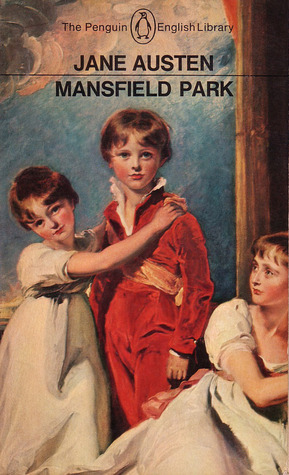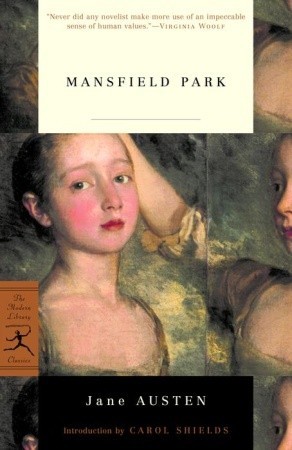 |
| I find this cover indescribably creepy. |
I want to preface today's guest post from Sophie Weeks - whose book, Outside the Spotlight, I recently reviewed - by saying that A) I love how wholeheartedly all of you are jumping into the various complex discussions of Mansfield Park, and B) I can't wait to see what you guys have to say about this one, which deals with some of the more...uncomfortable overtones of the book.
Mansfield Park and the Absent Hero
“’….Go to my father if you want to be complimented. He will satisfy you. Ask your uncle what he thinks, and you will hear compliments enough: and though they may be chiefly on your person, you must put up with it, and trust to his seeing as much beauty of mind in time’
Such language was so new to Fanny that it quite embarrassed her.
‘Your uncle thinks you very pretty, dear Fanny—and that is the long and the short of the matter…the truth is, that your uncle never did admire you till now—and now he does. Your complexion is so improved!—and you have gained so much countenance!—and your figure—Nay, Fanny, do not turn away about it—it is but an uncle. If you cannot bear an uncle’s admiration what is to become of you?’” (181)
Such language was so new to Fanny that it quite embarrassed her.
‘Your uncle thinks you very pretty, dear Fanny—and that is the long and the short of the matter…the truth is, that your uncle never did admire you till now—and now he does. Your complexion is so improved!—and you have gained so much countenance!—and your figure—Nay, Fanny, do not turn away about it—it is but an uncle. If you cannot bear an uncle’s admiration what is to become of you?’” (181)
In most Jane Austen novels there is a pattern that will be readily apparent to any of her readers. The heroine has a father who is either ineffectual or absent. Because of this, she takes on far more authority within the household than one might expect. Things inevitably degenerate into difficulties, social or material, which are then righted by the hero-father, who swoops in to correct everything and "rescue" the heroine. This pattern is most pronounced, perhaps, in Pride and Prejudice, but it also plays a significant part in Emma, Northanger Abbey, Sense and Sensibility and Persuasion. Sometimes the heroine's difficulties are brought on by herself, in which case the hero-father must admonish and correct her behavior, and sometimes they are wrought by other imprudent relations, which must be dealt with in other ways. But the bottom line is that the heroine marries an active hero, who has an important role in the plot.
Except in Mansfield Park. If we cast our minds over the things that Edmund actually does in the plot—falling in love with Mary Crawford, engaging in amateur theatricals, and supporting the marriage of Fanny to Crawford—we do not find much that helps Fanny (or anyone else). Edmund does not even, after he becomes a romantic object, perform any significant actions that relieve the heroine or give her comfort. He is, in fact, misguided and vaguely neglectful of Fanny throughout much of the novel. Not to put too fine a point on it, Edmund is rather a boob, and even he senses his utter inadequacies as hero, suggesting to Fanny at one point, “Go to my father if you want to be complimented”.
His father, Sir Thomas, manages his family in an astonishingly uncompromising manner, and his power is doubted by none. Indeed, had he not traveled to Antigua for a significant portion of the book, it seems unlikely that there should have been a novel. Families governed constantly by men such as Sir Thomas do not provide fodder for novels. Throughout the course of the text, it is not Edmund who wins Fanny, but the park itself and Sir Thomas in the position of its owner in a frightening threat of incest that is, I suspect, behind much of the popular antipathy for Mansfield Park. One film adaptation apparently found Sir Thomas so problematic that it seemed appropriate to direct his threatening power (sexual and otherwise) towards the helpless natives of Antigua in a way that the novel in no-wise suggests.
Sir Thomas’ interest in Fanny after his return from Antigua is frequently couched in terms of her “growth” and her color, which in his company is often quite scarlet with shyness or mortification. Here and elsewhere, there are clear indications of his interest in Fanny’s physical person. Nowhere, of course, is it made explicit to the point of outright disturbing the text, and yet disturb the text it does. At the beginning of the novel, Sir Thomas seems almost another monstrous father like General Tilney of Northanger Abbey; by the end, he has surpassed his own son in taking the role of the hero with regard to Fanny.
 |
| Equally creepy... |
There are obvious connections between economic and sexual power, and Fanny’s powerful love for Mansfield Park delivers her largely into her uncle’s power (as, indeed, he recognizes, when he punishes her by sending her away to visit her family for a time). By the end of Mansfield Park, Fanny is situated in the nearby parsonage with Edmund, which “soon grew as dear to her heart and as thoroughly perfect in her eyes as everything within the view and the patronage of Mansfield Park had long been.” It is clear, then, that by marrying Edmund, Fanny is not only kept within the Bertram family, but within the domain of Mansfield Park and Sir Thomas. In the conclusion, Sir Thomas “realizes a great acquisition in the promise of Fanny for a daughter.” It goes perhaps without saying that none of the language referring to Edmund and Fanny’s union is nearly so proprietary, and, in fact, Sir Thomas and Fanny’s “mutual attachment” is more explicitly described, as “After settling her at Thornton Lacey with every kind attention to her comfort, the object of almost every day was to see her there, or get her away from it.”
The powerful menace of Sir Thomas has turned benevolent and is needfully displaced, his desire to secure her for himself transferring to his desire to secure her for a daughter. The incest between cousins replaces the less-acceptable potential for incest between uncle and niece, and everything is tied up more or less smoothly by the conclusion. Sir Thomas is the sole living, present and effective father-figure in Austen’s major works, but the narrative cost is to Edmund. Without some absence of male authority on which to seize, Edmund cannot be an active or powerful hero; instead, he is reduced to the role of object of desire while everyone else acts to secure his comfort and happiness. Instead, Sir Thomas becomes the locus of male authority and attentiveness, calling into question the positioning of both hero and father in Austen’s work..
 |
| Click the pic to be taken to the Austen in August Main Page! Thanks to faestock & inadesign for the images used to create this button. |

I agree with basically everything you've said here, Sophie, about Sir Thomas vs. Edmund and lack of hero, etc...
ReplyDeleteHOWEVER, I AM TRAUMATIZED because I've never put it together so succinctly in my head before. Traumatized, I say!
Thanks, Jessica--I'm afraid once you look at the novel this way, you can't unsee it!
DeleteMy, my! I'm with Jessica on this one. I've read this book two times and while I realized Edmund wasn't hero matter; I never saw Sir Thomas in that light before. Truthfully, I still don't, but I can see why others would. Fascinating discourse! Thank you, Sophie.
ReplyDeleteThanks for your thoughtful comment, Sophia! I think I just kept going over in my head what was so weird about Mansfield Park, and once I realized how much weirdness centered on Sir Thomas's behavior towards Fanny in that moment when he reproaches her for not wanting to marry Crawford, I started to have a very nasty sense of him.
DeleteWell this is an interesting argument, and to an extent I agree, Sir Thomas does hold much of the power and leaves Edmund little room to do hero-type things but I really don't see any creepy incestuous feelings between him and Fanny, on either side. I truly believe that the feelings between them were father/daughter, and if Sir Thomas guided their lives afterwards isn't that what parents of that period did? In fact, Sir Thomas DOES do this for his son in law, he is actively involved with guiding Mr Yates' actions and I don't think he wants to get it on with him, it's just his parenting style once he's realised what horrors his stand-offish former style of parenting produced. By the end of the novel Sir Thomas has realised his parenting mistakes, and how they have formed his daughters into different women than he would have liked where Fanny is more what he would have wanted and so he is happy to love her as a daughter.
ReplyDeleteIf we look at Austen's heroes then Darcy, Captain Wentworth, Mr Knightley are all independent men. Tilney, Ferrars and Bertram all dependent on their parents to an extent, and yes, Edmund is the only one of those three who isn't thrown off by his parents or outrages parental feelings in his marriage but I don't think the worse of him for that. When you add this less heroic hero and the understated romance between Edmund and Fanny (in fact not stated at all, we're just told that it happened) and you can see why this is the least romantic of Austen's works, but this is not primarily a romance novel, in my opinion, it's more of a look at nature v nurture in a family setting with a romance thrown in.
I like your idea of the book as a nature/nurture debate, and your division of independent/dependent heroes is one I hadn't considered before. Perhaps this explains why I'm not all that crazy about Ferrars either!
Delete